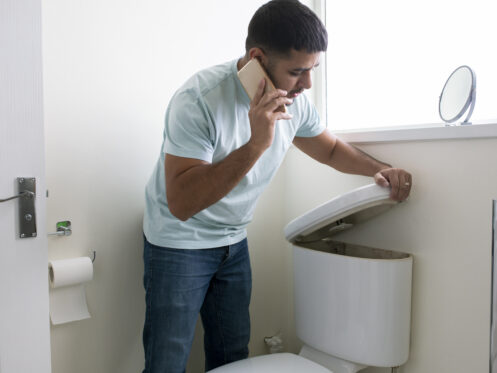Toilets are modern amenities that help make our lives more convenient and sanitary. While toilets can handle human waste, these receptacles are not meant to dispose of other items. Whether it happens during a moment of forgetfulness or on a regular basis, flushing the wrong items down your toilet can wreak havoc on your drainpipes and the environment. Review this checklist of common items to steer clear of flushing in order to protect your plumbing.
Why Should I Care About What Goes Down the Toilet?
Toilet hardware processes human waste and dissolved toilet paper. According to the national public utility company American Water, the average toilet pipe is only 4 inches in diameter at its widest. This means that even small or supposedly harmless trash and garbage can cause major plumbing problems within a toilet. In layman’s terms, a helpful way to avoid problems is to only flush the “Four Ps” down the toilet: pee, poop, puke, and (toilet) paper.
Trying to flush any other items can cause the following problems:
- Raw sewage overflow
- Contaminated water system
- Potential exposure to disease-carrying organisms
- Clogged drainpipes
- Higher sewage maintenance costs and utility bills
- Environmental pollution from sewage spills
- Water-damage repair expenses
What Items Should Never Go Down the Toilet?
Because you may have heard of people flushing everything from photographs to goldfish down the toilet, it is unsurprising that some individuals may not think twice about disposing of the wrong items in their plumbing. In popular culture, movies often depict scorned lovers flushing wedding rings down the drain or smokers disposing of cigarette butts in the same way. Even in commercials, home goods products that companies advertise as “flushable” are actually the last items that belong in the sewer or septic tank. Because old habits die hard, it is helpful to review a survey of items that you should never toss in the toilet.
Paper Towels or Facial Tissue
It is easy to assume that since toilet paper belongs in the toilet any type of paper product is suitable for toilet disposal as well. However, this is rarely the case. Whereas toilet paper eventually dissolves in water, the structure of paper towels and facial tissue causes these items to absorb water instead. Eventually, these items can bloat from absorbing water and clog septic tanks or sewage pipes. Always dispose of used paper towels in a designated wastebasket instead.
Cotton Balls, Rounds, or Swabs
Since personal care items made of cotton are usually small, some people assume that it is okay to flush them down the toilet. After all, these items are tiny enough to fit in a pipe, and cotton is a fiber that should break down naturally. Like paper towels, however, commercial cotton products do not break down in water. Instead, the purpose of cotton products is often to absorb as much water and particles as possible. These swollen cotton products then accumulate in pipelines and can result in bent or broken pipes over time.
“Flushable” Baby Wipes or Wet Wipes
Despite the advertising, flushable wipes are not biodegradable and will not decompose in water. Instead, these wipes can eventually create massive clumps that can lodge in drainpipes and block the toilet. When intact wipes cause backed-up sewer lines, plungers can no longer do the job, and you would need to hire professional help to extract the clog. Always dispose of these wipes in trash bins instead.
Feminine Hygiene Products
Feminine hygiene products are some of the worst items to flush down the toilet. In fact, you may have noticed that public restrooms often display signs or advisories to never flush these items. Tampons and sanitary pads absorb liquid instead of disintegrating in water.
In order to support menstruation, these products can even expand several times larger than their original size. Such bloating can eventually back up your system and cause the toilet to overflow. To avoid this, dispose of feminine hygiene products by wrapping them in a small sanitary bag and then tucking the bag discreetly into a waste bin.
Cooking Oils, Fats, or Grease
Many people already know not to pour hot grease down the sink to reduce the risk of clogs. But it is equally important not to pour cooking oil, fat, or grease into the toilet. Although these by-products begin in liquid form, they solidify in cold toilet water and attach to the inner lining of your pipes. This cooled grease creates a concealed mass, growing thicker and eventually causing other waste products to stick to it. Instead of pouring hot grease or oil into the toilet, let it cool off completely after cooking. Then, wrap the fatty solids into a sealed container and throw the container away.
Fish, Reptiles, Amphibians, or Marine Life
Whether living or dead, animals should never go into the toilet. Although you may have heard the myth that flushing a fish can “release” it back into the wild, this inhumane act is more likely to kill the animal within minutes instead. The chemical treatment methods of both sewers and septic tanks make it highly improbable that a small animal would ever make it out of the process alive.
You should also avoid releasing these animals into lakes or ponds since they could be an invasive species that wreak havoc on local ecosystems. If you need to remove a live animal, call a shelter or animal refuge instead. Similarly, toilets make poor burial sites for dead fish since it is unlikely that they will ever disintegrate in your pipe. Plan a natural burial in the backyard so that it can decompose organically instead.
Medications or Cosmetics
Toilet water cannot destroy the active ingredients in pills or other medications. Instead, flushing medication can result in harmful pollution of the water supply. Pharmaceuticals like painkillers, antibiotics, antidepressants, stimulants, laxatives, and sedatives can all mix to create a toxic soup that harms rivers and oceans. Fortunately, most local pharmacies have medication disposal or take-back programs to help you discard unused or expired medicine. These programs can also help you eliminate old cosmetics like expired face wash or moisturizer.
Paint or Other Hazardous Materials
While paint may seem like a mere liquid, this product is often a chemical cocktail of various pigments, solvents, extenders, binders, resins, oils, or additives. The unique combination of chemicals is what gives paint its strong smell. Pouring leftover paint down your toilet can pollute the water supply. To dispose of old paint, contact a local drop-off site instead. Household products like oven cleaners or tile degreasers are similarly hazardous to the environment. Instead of flushing these household goods, you can contact the U.S. Environmental Protection Agency for local collection programs in your area.
Dental Floss
Dental floss is a long filament or cord usually made of nylon, Teflon, or plastic. Whether waxed or unwaxed, these materials do not dissolve easily in water. You should never flush floss down the toilet. Given its structure, dental floss can also act as a seine net that wraps around toilet debris and traps it in your pipes. It can even wrap around movable parts of a septic tank. When this happens, floss becomes virtually impossible to remove without the help of a professional plumber.
Kitty Litter
Not all animal waste is equal. Unlike human waste, flushing feline waste down the toilet can introduce dangerous parasites into the water supply. The most common of these parasites is toxoplasma gondii, a toxic protozoan that can cause serious infections in humans. And because the purpose of the litter itself is to absorb water instead of dissolving it, pouring kitty litter into the toilet can cause it to expand into a hard clump and clog the pipe. Always place soiled litter into a disposable bag, securing it tightly before throwing it away.
Hair
Hair does not dissolve in water. Instead, hair floats and wraps around debris before eventually sticking to the inner pipes of your plumbing. Never toss hair from your brush or comb into the toilet. Always dispose of shed hair in the waste bin. The same goes for hair extensions, weaves, and similar products.
Bandages
Commercial bandages are made of non-biodegradable plastics that contaminate the water supply. In addition, the sticky adhesive portion can attach to other debris and create a giant clog. Throw bandages away in the trash can instead.
Food or Chewing Gum
Although chewing gum may appear soft, it is insoluble in water. Its cohesive nature also means it sticks to other debris and can create a hard clog. Always dispose of chewing gum properly in the trash. Similarly, you should not flush uneaten food regardless of how soft or mushy it looks. Most foods can eventually congeal and create buildup on pipes. Dispose of the softest foods in a garbage disposal, use it as garden compost, or throw the rest in the trash.
Get Expert Help Today
When it comes to your toilet system, a little caution can go a long way in preventing plumbing emergencies. When plumbing problems are unavoidable, however, contact the experts for help. Cal’s Plumbing provides top plumbing services for homes in Tucson, AZ and the surrounding areas. Whether you need a professional to snake your clogged drain, backflow prevention, or toilet installation and repair, our team can help. Contact Cal’s Plumbing for details today.





